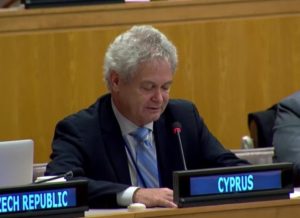 74th Session of the United Nations General Assembly on the Report of the International Court of Justice
74th Session of the United Nations General Assembly on the Report of the International Court of Justice
30 October 2019
Mr. President,
At the outset, allow me to thank President Yusuf for his introduction of this year’s report of the International Court of Justice. I also wish to thank former Registrar Philippe Couvreur for his dedicated service to the Court in his nearly 20 years as its Registrar.
The ICJ remains consubstantial to the raison d’être of the United Nations, which is to substitute the use of force and the rule of might with the prevalence of the rule of law at the international level and the peaceful settlement of disputes among states. It is fundamental in the architecture of the international rules-based order that has the UN at its core, and an indispensable pillar of effective multilateralism.
The Court’s judicial activity is generally acknowledged as a success story and the Court continues to reaffirm its central role year after year: settling disputes and creating and consolidating international law through its opinions and rulings and promoting the primacy of international law. We should be proud of the achievements of this principal organ of the United Nations and it is our collective duty to promote and protect it as an institution. Furthermore, all organs of the United Nations need to ensure that the conditions required for the Court to discharge its statutory responsibilities – both in its adjudicating and consultative competences – at such high level, are met: its autonomy, its independence and the availability of all necessary means.
In addition, from the strategic point of view, we welcome every step in the direction of expanding the scope of the competence of the Court, both rationae personae and rationae materiae. It is our duty to create the conditions for this to happen. Undoubtedly, the credibility of the Court is the major and decisive factor in this regard, but it is also crucial to increase the number of states that accept the optional clause of compulsory jurisdiction in Article 36, paragraph 2 of the Court’s Statute, as well as to widen the scope of their acceptance.
Furthermore, the number of treaties, both those concerning the settlement of disputes as well as those containing clauses for the settlement of disputes that confer jurisdiction to the ICJ, need to be increased and consolidated. Moreover, we need to further promote the idea of the availability of the Court as the means par excellence for the settlement of disputes with a legal dimension, even in cases where there is no prior commitment and a compromis would be required. Finally, the consultative function of the Court should be used even further to play a central role in the work of other organs and institutions in fulfilling their respective missions.
The authority of the Court must always be upheld. To this end, it is imperative that the decisions of the Court are universally accepted and implemented, without any exceptions. The overall record in this respect is very positive, but we need to be vigilant if we want to preserve such precious acquis. In this regard, the Security Council should always be ready to play its role assigned to it by article 94.2 of the Charter. Going even further, we would like to see the permanent members of the Council commit to not using their veto in instances falling under the remit of the said Article.
Mr. President,
In parallel to the outstanding performance of the Court in adjudicating disputes between states, which, as we see in the report, are constantly increasing, I would also like to underline the advisory function of the Court, which proves more and more that it is of cardinal importance to the UN system and the international rules-based order. In this context, I wish to single out the Advisory Opinion of 25 February 2019, on the Legal Consequences of the Separation of the Chagos Archipelago from Mauritius in 1965. The position of my delegation with regard to the substance of the Opinion was stated during our discussions here last May.
What I wish to underline more broadly is the importance of the clear reaffirmation, by the Court, of cardinal norms of international law – most of which have emerged and have been consolidated in the aftermath of the creation of the United Nations – such as self-determination, decolonization, the sovereign equality of states, territorial integrity, environmental law, as well as the law of the sea and the delimitation of maritime zones. This is a vital contribution of the ICJ in the settlement of related disputes between states in a cooperative and pragmatic way that rises above ideological, national, and political issues that hinder the spirit that should prevail in international relations today and should be left in the past.
Before I close, Mr. President, allow me express my concern concerning the financial situation of the Court. We heard President Yusuf state here today that the budget of the Court does not correspond to its growing case load and that its underfunding could undermine its ability to perform its functions properly. On our part, we welcome the considerable growth of the Court’s workload over the course of the last 20 years because it proves that States are more and more comfortable to revert to the Court in order to seek authoritative pronouncements on complex legal issues. This compels us to find durable remedies to the Court’s shortages, to make available to it the necessary resources accompanied by the ability to mobilize them in a timely manner, and to ensure that we keep investing in this institution in a manner that enables the fulfillment of its mandate.
Thank you, Mr. President.